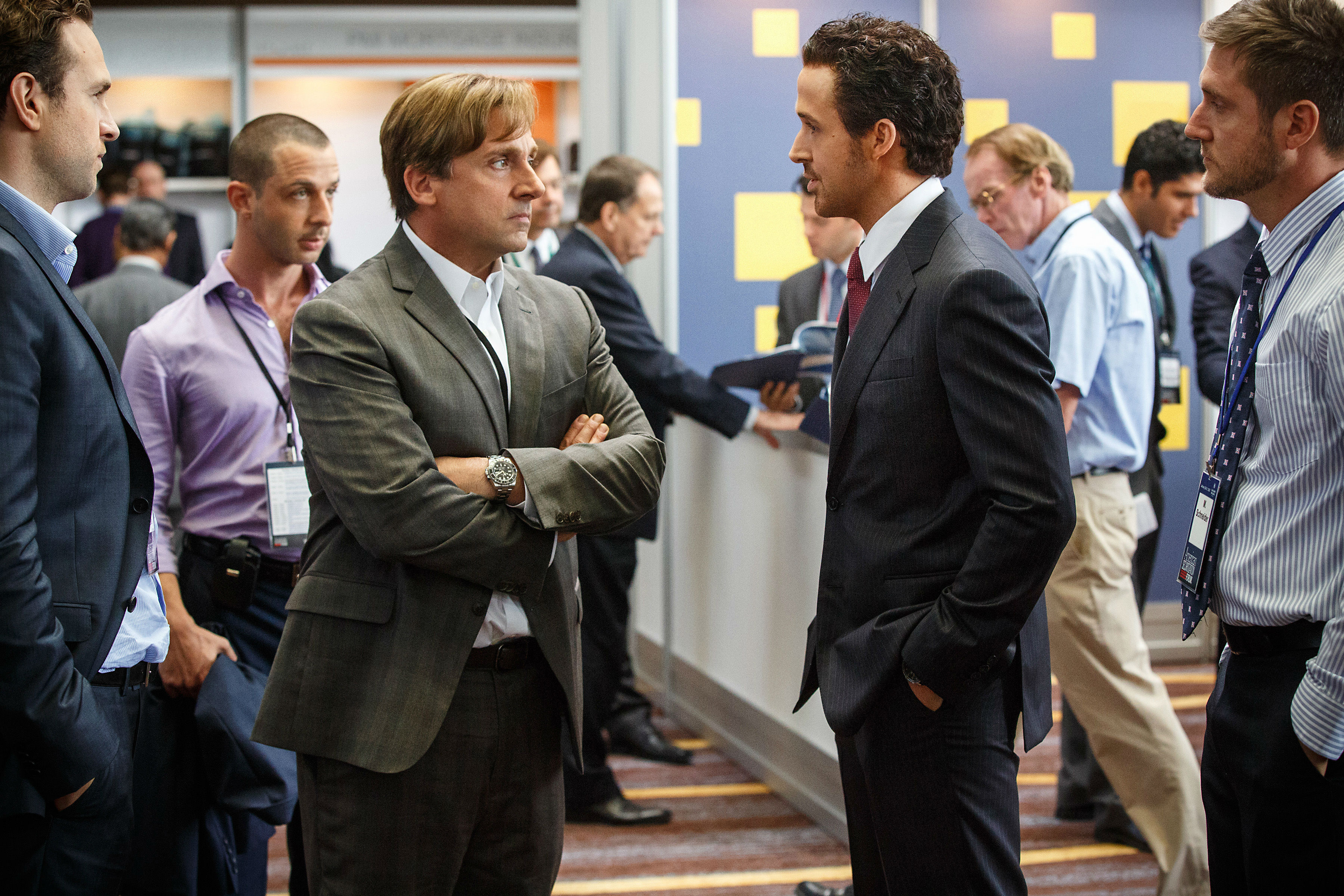
MPAA Rating: R | Rating: ★★½
Release year: 2015
Genre: Biography, Drama Director: McKay
This was not the Brick Tamland spinoff I was hoping for.
Well, Steve Carell is here. And he’s yelling loudly in an over-the-top performance. He’s acting socially awkward and emotionally aloof and saying offensive things. So maybe he is channeling Brick from filmmaker Adam McKay’s Anchorman films. After all, McKay is directing here, his first foray into the realm of directing a drama (and without his buddy Will Ferrell as the lead). Much like Anchorman‘s comedic lineup, The Big Short has quite a star-studded cast–Ryan Gosling, Brad Pitt, and Christian Bale are all here, as well as Marisa Tomei, Melissa Leo, Margot Robbie, and Selena Gomez in cameo performances.
The Big Short a bit of a mess, really, unsure of its own identity or tone. Is this film supposed to be funny? Dramatic? Condemning? Satirical? Heartbreaking? A documentary? Oscar-bait? It aims to be all of the above, which makes it ultimately feel inert and draining. Still, the message is not lost in the tonal confusion. McKay and Co. essentially punch you in the face with the dirty and destructive financial practices and systems that led to the housing market crash of 2008. They literally spell it out for you, as the Wall Street jargon is beyond most people’s understanding. I actually learned quite a bit of banking terms, many from well-known celebrities explanations directed towards the movie audience. There’s a lot of fourth-wall breaking, which can be effective when done for humor or fostering empathy (Woody Allen does this quite well). But when it’s didactic in nature and sporting a snide tone, it sort of loses any whimsy. The Big Short trades its whimsy for weightiness, doing its best to be An Important Film while simultaneously making the audience feel burdened.
We all know what happened. Due to crooked financial practices and a broken mortgage system, the housing market imploded, leaving millions of Americans jobless and homeless and setting off a worldwide economic crisis. So there’s little surprise or tension as the various characters played by big-name actors discover and explain what exactly led to this point. It’s expository without being necessarily interesting, though the script does strive to make drawn-out conversations using financial colloquialisms somewhat engaging. McKay knows our brains shut off when we start hearing this stuff (at least mine does). So he keeps the camera constantly moving, using fast edits at strange moments, zooming in and out of focus, breaking the fourth wall, and trying every other trick to keep you focused. It works at times and is distracting at other moments.
The singular strength of The Big Short is by telling the story from the perspective of those who saw the crisis coming and did something about it–they bet against the system when everyone thought they were crazy, and ultimately made millions off of others’ misfortune. Yet the characters truly wrestle with these decisions (especially Carell’s) and must consider the consequences of their actions. Are they any different than the greedy investors, bankers, and brokers? Can they live with themselves becoming rich off of others’ poverty? If they saw the disaster coming, why was their first instinct to make more money for themselves instead of warn people? I did appreciate Christian Bale’s character and his willingness to hold to his position despite everyone’s doubt and derision. He was honest and up front about what would happen, but nobody wanted to listen. I also appreciated Carrel’s descent into disillusionment with the system and his final prophetic speech. Still, it’s hard for me to call these men prophets of their time. A true prophetic voice stands up for truth and speaks out against injustice, calling a people to repentance and to come back to their senses. I’m not sure that’s what these guys did; they did make money off the whole tragedy, right?
The Big Short‘s better filmic cousin is this year’s Spotlight, a film addressing a similar public crisis about the discovery of broken system featuring a star-studded cast, but with a totally different aesthetic and approach. Where Spotlight allows the story to breathe and the characters to quietly and steadily discover the terrifying truth, The Big Short goes for bombast, chastisement, and snark. I prefer the former to the latter. Also, I love lamp.
IMDB Listing: http://www.imdb.com/title/tt1596363/